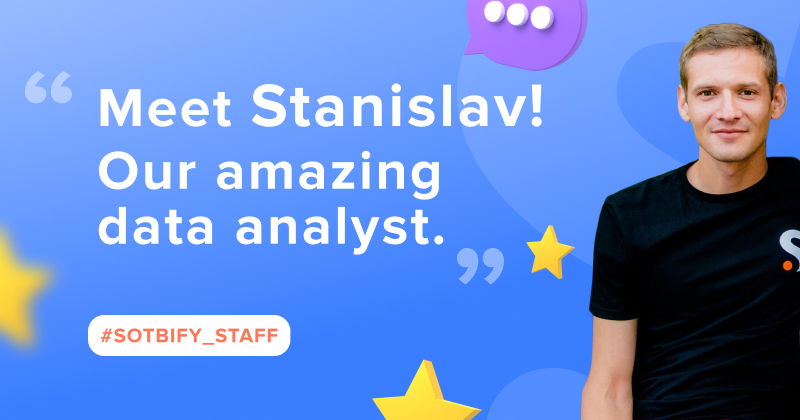Hey everybody, here's Sotbify!
We continue to tell you about the cool guys from our team. This time we will meet Stas Protsenko.
Stas is a data analyst. Not just an ordinary employee, but a specialist with a capital S, and it is not about the name. During the preparation of the article we were surprised at how gifted and versatile Stas is.
In this article Stas is going to tell not only about himself and his way of becoming an analyst, but also to explain what kind of profession it is and what skills a specialist who wants to develop in this complicated but very interesting field should have.
Let's get acquainted!
Interviewee: «Tell us about yourself and your path to the profession».
Stas: «Hi! My name is Stas and I am 30 years old. First of all I am a physicist by education. I graduated from BSU Faculty of Physics, Department of laser physics and spectroscopy. There I also did my master's and PhD studies.
By coincidence, at the very beginning of my studies at the Physics Department I was interested in financial markets and during my higher education I was gradually increasing my qualification through studying various relevant information and conducting personal research. This helped to form a personal vision: "physics-mathematics-financial markets". After a while, this played a positive role.
At the same time I finished my mini-MBA program "Financial Management". At that time I definitively decided that I would devote myself entirely to finance and after some time I started working in the banking sector.
My areas of expertise included analysis of financial markets using Bloomberg and Reuters, improving methods of asset management, monitoring of various kinds of limitations, development of appropriate reports, participation in working groups on automation of business processes, and additional research to improve the quality of asset management. I was fortunate enough to receive training from the World Bank as part of my job, there were also other courses to improve my skills».
I: «What qualities should an analyst have?»
S: «I think this person should be inquisitive, creative, and educated in the field in which the analytical work is done. Such an education is needed rather to form a solid framework and get the most useful information in a unit of time.
These are obvious things, because otherwise we come to the point where there is no understanding of what is behind the numbers received and how to interpret them. Also this person must be able to admit mistakes and look for solutions».
I: «Tell about the analyst's role in the workflow».
S: «The role of the analyst is to know and understand as much as possible about the business process being analyzed. This requires studying the documentation, gaining a basic knowledge of the relevant area, knowing and understanding what metrics and factors affect or could affect, and being aware of the connection to other processes that are not part of the current research area but that are part of a higher level process».
I: «How often do you have to deal with routine?»
S: «Naturally, you can't do without a chore. This usually takes up most of the time. You need to determine the source of the data, assemble it into a model, perform preliminary analysis and processing if necessary. Next comes the planning of the computational experiment and its execution.
As a result, the analyst must prepare a detailed report describing the purpose and objective, the data used, their sources, what methods and tools were used for the analysis, the conclusion on the results of the work performed and possible solutions with an assessment of potential risks and benefits».
I: «How important is the analyst?»
S: «The importance of the analyst in the workflow is determined in equal measure by how much the end user is interested in it. If a conditional executive wants an analyst on staff because it's just fashionable, there's probably nothing good to come out of it for the two parties. Ideally, it's a synergy».
I: «What skills and knowledge are needed?»
S: «In a nutshell, these are general skills and what you personally think is important. This will probably sound ridiculous, but the main requirement is to learn to analyze on your own. The rest is a matter of time and desire.
On a more serious note, it's worth starting with the basics - analyzing spreadsheets. For me personally it was Excel for my lab work when I was a student. Then it was connection to data sources, solving optimization problems, etc. Then there were courses in Python, then courses in machine learning.
This allowed me to build models to estimate the probability of repayment when granting a loan to a user, as well as to do scientific work in graduate school, then there was the study of Excel at an advanced level: building data models, query editor, summary tables, connection to various data sources, then databases and their design, Power BI.
I want to emphasize that all of the above was studied not to "know", but to perform and solve certain tasks».
I: «Tell me about working in the Sotbify team».
S: «These are different tasks in content, but they all lie in the plane of financial markets. My function is to perform analysis of the task at hand with the preparation of a report to stakeholders. I use head, Excel, Power BI, Python, Miro, etc.
With the team we always discuss the current situation, statuses of different tasks, plan our work and constantly keep in touch with each other with feedback.
I: «How in-demand is the profession on today's market?»
S: «As I have already said, the real demand is determined by how interested in it the manager, the customer. As a rule, small organizations need 1-2 employees, sometimes a specialist is hired on a temporary basis. One thing is obvious - the increased awareness of the value of data. An analyst is equivalent to a process in time».
I: «Give some advice for those who want to enter the profession?»
S: «I am not a fan of advice, we are in different circumstances and for one person something can be perceived positively and for another - negatively. Everyone's life path and experience is unique and only the individual can answer whether or not the decision he or she made was the right one.
In order to become an analyst, one must understand whether one likes to engage in analysis in general in ordinary life. If the answer is yes, you must prepare yourself for a long and fascinating journey.
I myself believe that those who are interested in this field will be able to find exactly what is right for them, taking into account basic knowledge, financial and time constraints. The main thing is to work on yourself every day and not stop learning something. It won't be fast».
This was such an interesting and informative dialogue we had with Stas. It turned out to be a full-fledged mini-guide to the data analyst profession. So if any of our readers have ever thought about trying their hand in this area - now they should definitely have fewer questions.
And we'll continue to introduce you to our friendly team. So stay tuned so you don't miss a thing.
Friends, remember that every day is given for self-improvement and conquest of new heights. So don't waste your time, develop, make yourself better, don't be afraid to take a step toward the unknown - and get the future you want!





